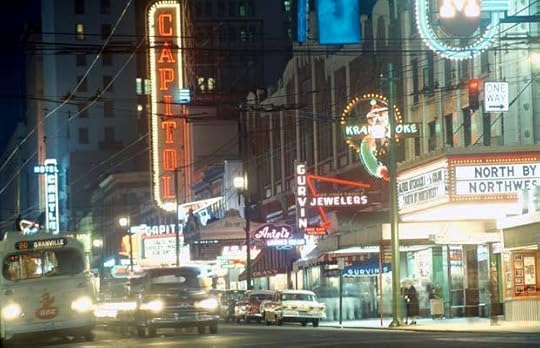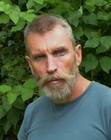The rain, the neon, the shining street, the cop at the end of it…
A TERMINAL CITY extract:
It’s 1959, Vancouver. Dan Kearney, a panel van driver, has just got a call to take an old girlfriend’s son home from 1026 Eyremount Drive.
The phone at the other end went dead. I left the lights on and locked up the place and went out to the Apache. Rain had come on again since I had walked into the apartment, and there was a smell of damp and old clothes in the van. There usually was. I sat looking out into the darkness for a moment. The rain on the windshield hung between me and the night and whatever lay ahead. I knew about British Properties. On the other side of Burrard Inlet, on the flanks of Cypress Mountain. Views down over Burrard Inlet and across to the city, safely far away. Big modern, flashy, boxy houses set back behind tall hedges, tall trees, privacy. A world up there with cleaning ladies and cooks and gardeners. The stationery job didn’t take me up there much. Or ever. I put on the wipers and the headlights and set off to find Mia’s son and whatever else this was about.
I went down Heather onto West Broadway, and into the Vancouver rainy night streets of hard neon and shining tarmac. Past the giant new red, white and blue BowMac sign at Alder. Hung a right at the high-up blue and red Dueck Chevrolet sign, ignored the advice of the white Dueck arrow. Humming over Granville Bridge in the rain, wipers beating, a whisker away from the Continental Hotel and big BUY BURNS SHAMROCK LARD in red and green, into the downtown heartland. Above every glowing, blazing front a cup, a saucer, a dancing cat, a waitress with tray. ORPHEUM. PLAZA. PARADISE. Plenty of people around even at this hour, in this weather. A queue along the street for North by Northwest at the VOGUE. A crowd milling out into the street after Last Train From Gun Hill at the CAPITOL. Under the far-up yellow Shell sign on the Granville Block, the big clock below telling me it was 10.40 and I was making good time. Hung a left, leaving behind the outlined Sun Tower, its little red rays, its glowing white nipple. Further behind again, gleaming, looking like it was throbbing, the revolving red W of the Woodwards mast. Beyond that the never-sleeping world of Chinatown.
Maybe I maligned the city. On a drive like this I could love Vancouver again. On a drive like this.
I was making good time but I would not be there in twenty-five minutes. Into the West End, with the woodframes tumbling down hand over fist and ten and fifteen floor apartment towers shooting up. Past the dark Georgia Auditorium, a show announcement and a For Sale sign hanging on the same wall, and over the Causeway and out of the lit and wide open spaces and into the Park, into the solid darkness and silence of those big trees.
Stanley Park. I’d loved it when I came to Vancouver and had no money and spent Sundays walking the paths, lying on the grass, watching dogs, watching people, watching the ocean, watching the mountains across the ocean. Longing, for something. I was less sure I loved it now, but as I tore on through it, for that moment, with the dark trees around me, it was like the rain on the windscreen, something solid and good between me and the rest of the hard world.
The great rising, falling, arc of Lions Gate Bridge. Another thing I had felt differently about once and since grown sick of. The traffic jams and hold ups and still paying tolls. We’d bought that bridge twice over.
The city had changed. Since I had come here, twice the size. People from all over. Since the war, kids everywhere. Ten, eleven, twelve-year olds. So it seemed. I was a whinging old fart. I had changed. I’d get away from it. Not soon enough. A little farm on the flat good land out along the Fraser Valley would be a fine thing. Little farms cost money. I wouldn’t make a little farm on Keyes Stationery and Retail Supplies wages. I had to be careful. I mustn’t blow it. I laughed out loud, stopped laughing quickly. Too much time alone.
I came out on Taylor, and onto Highland and that world of dark roads, high banks, high hedges, high trees, houses lurking out of sight. I slowed, checked a street name, drove on, winding round and round, climbing all the time into the night. I found I was on a different Drive, came off it again. I’d lost my touch. I slowed, checking numbers on posts, on mail boxes, on fine property walls of invisible houses.
It was on my right, facing out over the bay, looking down and across to the far-off shore of a hundred thousand winking white lights, on those gaudy warm colors of Granville, Broadway, Hastings from Gore to Abbott, all of it dulled by cloud and rain. A short sharp drive sloped down to the house. Peaked roofs over plenty of wings, plenty of chimneys, a turning space, three cars parked out front. Maybe as old as a couple of years, average-sized for British Properties, four or five times the size of Mia’s woodframe on Dunbar, twenty times – I didn’t know – I was guessing – the size of my two-room throw-down. A lot of lights were on. I turned the Apache in the drive and left it facing the road. I had seen no one, and then as I got out there was a man standing beside the van, a big guy in a fedora, a raincoat swept back, hands in his trouser pockets, a white gleaming shirt front and a tie that wasn’t under his ear.
‘Are you Calloway?’ I asked.




